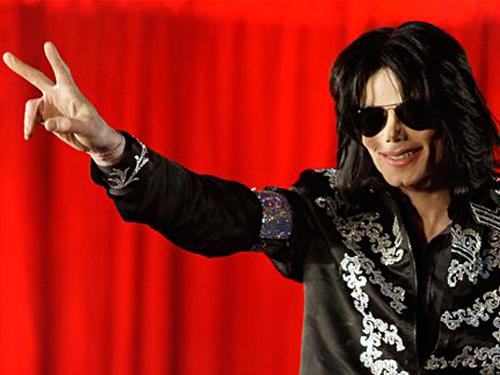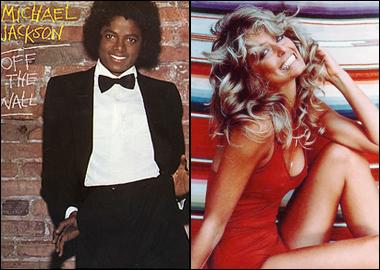 The pop icon was raised a Jehovah’s Witness, but according to some accounts had been “disfellowshipped” for various infractions. Last fall it was reported that Jackson had become a Muslim and changed his name to Mikaeel:
The pop icon was raised a Jehovah’s Witness, but according to some accounts had been “disfellowshipped” for various infractions. Last fall it was reported that Jackson had become a Muslim and changed his name to Mikaeel:
The 50-year-old singer, who has previously been photographed wearing a traditional Arab women’s veil, reportedly became a Muslim in a ceremony at a friend’s house in Los Angeles.
The singer, who was raised as a Jehovah’s Witness, is said to have sat on the floor and worn a small hat while an imam officiated at the home of Steve Porcaro, who composed music on his Thriller album.
He is said to have been encouraged by Canadian songwriter David Wharnsby and Phillip Bubal, a producer, who both approached him after he appeared ‘a bit down’.
A source told The Sun: ‘They began talking to him about their beliefs, and how they thought they had become better people after they converted. Michael soon began warming to the idea.
‘An imam was summoned from the mosque and Michael went through the shahada, which is the Muslim declaration of belief.’
Jehovah’s Witnesses discourage autopsies, but it’s up to the family. Muslims are far more strict against them, as are Jews. But an autopsy is proceeding on Jackson to determine the cause of death, which may be related to medications.
For Michael’s views on faith in his own words, this 2000 column he penned for Beliefnet at the behest of his friend, Rabbi Shmuley Boteach, is a must-read. It is titled “My Childhood, My Sabbath, My Freedom” What I wanted more than anything was to be ordinary. The Sabbath was when I could be…”
In one of our conversations together, my friend Rabbi Shmuley told me that he had asked some of his colleagues–writers, thinkers, and artists–to pen their reflections on the Sabbath. He then suggested that I write down my own thoughts on the subject, a project I found intriguing and timely due to the recent death of Rose Fine, a Jewish woman who was my beloved childhood tutor and who traveled with me and my brothers when we were all in the Jackson Five.Last Friday night I joined Rabbi Shmuley, his family, and their guests for the Sabbath dinner at their home. What I found especially moving was when Shmuley and his wife placed their hands on the heads of their young children, and blessed them to grow to be like Abraham and Sarah, which I understand is an ancient Jewish tradition. This led me to reminisce about my own childhood, and what the Sabbath meant to me growing up.
Read the rest…
More than anything, I wished to be a normal little boy. I wanted to build tree houses and go to roller-skating parties. But very early on, this became impossible. I had to accept that my childhood would be different than most others. But that’s what always made me wonder what an ordinary childhood would be like.
There was one day a week, however, that I was able to escape the stages of Hollywood and the crowds of the concert hall. That day was the Sabbath. In all religions, the Sabbath is a day that allows and requires the faithful to step away from the everyday and focus on the exceptional. I learned something about the Jewish Sabbath in particular early on from Rose, and my friend Shmuley further clarified for me how, on the Jewish Sabbath, the everyday life tasks of cooking dinner, grocery shopping, and mowing the lawn are forbidden so that humanity may make the ordinary extraordinary and the natural miraculous. Even things like shopping or turning on lights are forbidden. On this day, the Sabbath, everyone in the world gets to stop being ordinary.
But what I wanted more than anything was to be ordinary. So, in my world, the Sabbath was the day I was able to step away from my unique life and glimpse the everyday.
Sundays were my day for “Pioneering,” the term used for the missionary work that Jehovah’s Witnesses do. We would spend the day in the suburbs of Southern California, going door to door or making the rounds of a shopping mall, distributing our Watchtower magazine. I continued my pioneering work for years and years after my career had been launched.
Up to 1991, the time of my Dangerous tour, I would don my disguise of fat suit, wig, beard, and glasses and head off to live in the land of everyday America, visiting shopping plazas and tract homes in the suburbs. I loved to set foot in all those houses and catch sight of the shag rugs and La-Z-Boy armchairs with kids playing Monopoly and grandmas baby-sitting and all those wonderfully ordinary and, to me, magical scenes of life. Many, I know, would argue that these things seem like no big deal. But to me they were positively fascinating.
The funny thing is, no adults ever suspected who this strange bearded man was. But the children, with their extra intuition, knew right away. Like the Pied Piper of Hamlin, I would find myself trailed by eight or nine children by my second round of the shopping mall. They would follow and whisper and giggle, but they wouldn’t reveal my secret to their parents. They were my little aides. Hey, maybe you bought a magazine from me. Now you’re wondering, right?
Sundays were sacred for two other reasons as I was growing up. They were both the day that I attended church and the day that I spent rehearsing my hardest. This may seem against the idea of “rest on the Sabbath,” but it was the most sacred way I could spend my time: developing the talents that God gave me. The best way I can imagine to show my thanks is to make the very most of the gift that God gave me.
Church was a treat in its own right. It was again a chance for me to be “normal.” The church elders treated me the same as they treated everyone else. And they never became annoyed on the days that the back of the church filled with reporters who had discovered my whereabouts. They tried to welcome them in. After all, even reporters are the children of God.
When I was young, my whole family attended church together in Indiana. As we grew older, this became difficult, and my remarkable and truly saintly mother would sometimes end up there on her own. When circumstances made it increasingly complex for me to attend, I was comforted by the belief that God exists in my heart, and in music and in beauty, not only in a building. But I still miss the sense of community that I felt there–I miss the friends and the people who treated me like I was simply one of them. Simply human. Sharing a day with God.
When I became a father, my whole sense of God and the Sabbath was redefined. When I look into the eyes of my son, Prince, and daughter, Paris, I see miracles and I see beauty. Every single day becomes the Sabbath. Having children allows me to enter this magical and holy world every moment of every day. I see God through my children. I speak to God through my children. I am humbled for the blessings He has given me.
There have been times in my life when I, like everyone, has had to wonder about God’s existence. When Prince smiles, when Paris giggles, I have no doubts. Children are God’s gift to us. No–they are more than that–they are the very form of God’s energy and creativity and love. He is to be found in their innocence, experienced in their playfulness.
My most precious days as a child were those Sundays when I was able to be free. That is what the Sabbath has always been for me. A day of freedom. Now I find this freedom and magic every day in my role as a father. The amazing thing is, we all have the ability to make every day the precious day that is the Sabbath. And we do this by rededicating ourselves to the wonders of childhood. We do this by giving over our entire heart and mind to the little people we call son and daughter. The time we spend with them is the Sabbath. The place we spend it is called Paradise.

